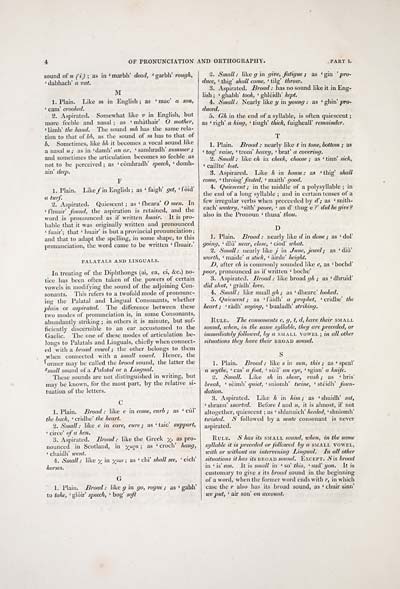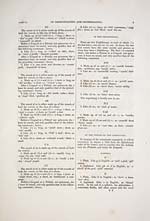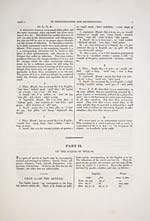Download files
Complete book:
Individual page:
Thumbnail gallery: Grid view | List view

OF PKONUNCIATION AND ORTHOGRAPHY,
sound of ?< (i) ; as in 'marbh' dead, 'garbh' rov^h,
' dabhach' a vat.
M
1. Plain. Like m in English ; as ' mac' a son,
' cam' crooked.
2. Aspirated. Somewhat like v in English, but
more feeble and nasal ; as ' rahàthair' O mother,
' làmh' tJte hand. The sound mh has the same rela-
tion to that of M, as the sound of m has to that of
b. Sometimes, like bh it becomes a vocal sound like
a nasal u; as in 'darah' an ox, ' samhradh' summer;
and sometimes the articulation becomes so feeble as
not to be perceived ; as ' còrahradh' speech, ' domh-
1. Plain. Like/in English ; as ' faigh' get, 'fòid'
a turf.
2. Aspirated. Quiescent ; as ' flieara' O men. In
' fhuair' found, the aspiration is retained, and the
word is pronounced as if written hvair. It is pro-
bable that it was originally written and pronounced
' fuair'; that ' huair' is but a provincial pronunciation ;
and that to adapt the spelling, in some shape, to this
pronunciation, the word came to be written ' fhuair.'
In treating of the Diphthongs (ai, ea, ei, &c.) no-
tice has been often taken of the powers of certain
vowels in modifying the sound of the adjoining Con-
sonants. This refers to a twofold mode of pronounc-
ing the Palatal and Lingual Consonants, whether
plain or aspirated. The difference between these
two modes of pronunciation is, in some Consonants,
abundantly striking ; in others it is minute, but suf-
ficiently discernible to an ear accustomed to the
Gaelic. The one of these modes of articulation be-
longs to Palatals and Linguals, chiefly when connect-
ed with a broad vowel ; the other belongs to them
when connected with a small vowel. Hence, the
former may be called the broad sound, the latter the
^mall sound of a Palatal or a LÌ7igual.
These sounds are not distinguished in writing, but
may be known, for the most part, by the relative si-
tuation of the letters.
' cùl'
1. Plain. Broad : like c i
the back, « cridhe' the heart.
2. Small: like c in care, cure; as ' taic' support,
' circe' of a hen.
3. Aspirated. Broad : like the Greek ;;;;, as pro-
nounced in Scotland, in p^wga ; as ' croch' Jianff,
' chaidh' went.
4. Small : like x in Z™" : ^^ ' clii' shall see, ' eich'
horses.
G
1. Plain. Broad: like jr in go, rogue; as ' gabh'
to take, ' glòir' speech, ' bog' soft
2. Small: like j- in give, fatigue ; as 'gin 'pro-
duce, ' thig' shall come, ' tilg' throw.
3. Aspirated. Broad : has no sound like it in Eng-
hsh ; < ghabh' took, ' ghleidh' kept.
4. Small: Nearly like t/ in young : as ' ghin' pro-
5. Gh in the end of a syllable, is often quiescent ;
as ' righ' a king, ' tiugh' thi(A, fuigheall' remainder.
1. Plain. Broad : nearly like t in tone, bottom ; as
' tog' raise, ' trom' heavy, ' brat' a covering.
2. Small : like ch in cheek, choose ; as ' tinn' sick,
' caillte lost.
3. Aspirared. Like h in house: as 'thig' shall
come, ' throisg' fasted, ' maith' good.
4. Quiescent ; in the middle of a polysyllable ; in
the end of a long syllable ; and in certain tenses of a
few irregular verbs when preceeded by d'; as ' snith-
each' watery, 'sith' peace, ' an d' thug e ?' did he give?
also in the Pronoun ' thusa' thou.
D
1. Plain. Broad: nearly ììke d in done ; as ' dol'
going, ' dlù' ìiear, close, ' ciod' zvhat.
2. Small: nearly like y in June, jewel; as 'diiì'
worth, ' maide' a stick, ' àirde' height.
JD, after ch is commonly sounded like c, as ' bochd'
poor, pronounced as if written ' bochc'
3. Aspirated. Broad : like broad gh ; as ' dhruid'
did shut, ' gràdh' love.
4. Small: like small gr/j ; s.s ' àhe&rc' looked.
5. Quiescent ; as ' f àidh' a prophet, ' cridhe' the
heart ; ' ràdh' saying, ' bualadh' striking.
Rule. The consoncmts c, g, t, d, have their small
sound, ichcii, in the same syllable, they are preceded, or
immcdiutdy followed, by a s.mall vowel ; in all other
situations they have their broad sound.
1. Plain. Broad: like « in sun, this; as ' speal'
a scythe, ' cas' afoot, ' sùil' an eye, ' sgian' a knife.
Small. Like sh in show, rash ; as ' bris'
mh' twine, ' steidh' foun-
break, ' sèimh' quiet, '
dation.
3. Aspirated. Like h in him ; as ' shuidh' sal,
' shrann' snorted. Before I and n, it is almost, if not
altogether, quiescent ; as ' shlanuich' iiealed, 'shniomh'
twisted. S followed by a mute consonant is never
aspirated.
Rule. S has its small sound, when, in the same
syllable it is preceded or followed by a small vowel,
with or without an interveniiig Lingual. In all other
sitvations it has its broad sound,. Except. <S^is broad
in ' is' am. It is small in ' so' this, ' sud' yon. It is
customary to give s its broad sound in the beginning
of a word, when the former word ends with r, in which
case the r also has its broad sound, as ' chuir sinn'
we put, ' air son' on account.
sound of ?< (i) ; as in 'marbh' dead, 'garbh' rov^h,
' dabhach' a vat.
M
1. Plain. Like m in English ; as ' mac' a son,
' cam' crooked.
2. Aspirated. Somewhat like v in English, but
more feeble and nasal ; as ' rahàthair' O mother,
' làmh' tJte hand. The sound mh has the same rela-
tion to that of M, as the sound of m has to that of
b. Sometimes, like bh it becomes a vocal sound like
a nasal u; as in 'darah' an ox, ' samhradh' summer;
and sometimes the articulation becomes so feeble as
not to be perceived ; as ' còrahradh' speech, ' domh-
1. Plain. Like/in English ; as ' faigh' get, 'fòid'
a turf.
2. Aspirated. Quiescent ; as ' flieara' O men. In
' fhuair' found, the aspiration is retained, and the
word is pronounced as if written hvair. It is pro-
bable that it was originally written and pronounced
' fuair'; that ' huair' is but a provincial pronunciation ;
and that to adapt the spelling, in some shape, to this
pronunciation, the word came to be written ' fhuair.'
In treating of the Diphthongs (ai, ea, ei, &c.) no-
tice has been often taken of the powers of certain
vowels in modifying the sound of the adjoining Con-
sonants. This refers to a twofold mode of pronounc-
ing the Palatal and Lingual Consonants, whether
plain or aspirated. The difference between these
two modes of pronunciation is, in some Consonants,
abundantly striking ; in others it is minute, but suf-
ficiently discernible to an ear accustomed to the
Gaelic. The one of these modes of articulation be-
longs to Palatals and Linguals, chiefly when connect-
ed with a broad vowel ; the other belongs to them
when connected with a small vowel. Hence, the
former may be called the broad sound, the latter the
^mall sound of a Palatal or a LÌ7igual.
These sounds are not distinguished in writing, but
may be known, for the most part, by the relative si-
tuation of the letters.
' cùl'
1. Plain. Broad : like c i
the back, « cridhe' the heart.
2. Small: like c in care, cure; as ' taic' support,
' circe' of a hen.
3. Aspirated. Broad : like the Greek ;;;;, as pro-
nounced in Scotland, in p^wga ; as ' croch' Jianff,
' chaidh' went.
4. Small : like x in Z™" : ^^ ' clii' shall see, ' eich'
horses.
G
1. Plain. Broad: like jr in go, rogue; as ' gabh'
to take, ' glòir' speech, ' bog' soft
2. Small: like j- in give, fatigue ; as 'gin 'pro-
duce, ' thig' shall come, ' tilg' throw.
3. Aspirated. Broad : has no sound like it in Eng-
hsh ; < ghabh' took, ' ghleidh' kept.
4. Small: Nearly like t/ in young : as ' ghin' pro-
5. Gh in the end of a syllable, is often quiescent ;
as ' righ' a king, ' tiugh' thi(A, fuigheall' remainder.
1. Plain. Broad : nearly like t in tone, bottom ; as
' tog' raise, ' trom' heavy, ' brat' a covering.
2. Small : like ch in cheek, choose ; as ' tinn' sick,
' caillte lost.
3. Aspirared. Like h in house: as 'thig' shall
come, ' throisg' fasted, ' maith' good.
4. Quiescent ; in the middle of a polysyllable ; in
the end of a long syllable ; and in certain tenses of a
few irregular verbs when preceeded by d'; as ' snith-
each' watery, 'sith' peace, ' an d' thug e ?' did he give?
also in the Pronoun ' thusa' thou.
D
1. Plain. Broad: nearly ììke d in done ; as ' dol'
going, ' dlù' ìiear, close, ' ciod' zvhat.
2. Small: nearly like y in June, jewel; as 'diiì'
worth, ' maide' a stick, ' àirde' height.
JD, after ch is commonly sounded like c, as ' bochd'
poor, pronounced as if written ' bochc'
3. Aspirated. Broad : like broad gh ; as ' dhruid'
did shut, ' gràdh' love.
4. Small: like small gr/j ; s.s ' àhe&rc' looked.
5. Quiescent ; as ' f àidh' a prophet, ' cridhe' the
heart ; ' ràdh' saying, ' bualadh' striking.
Rule. The consoncmts c, g, t, d, have their small
sound, ichcii, in the same syllable, they are preceded, or
immcdiutdy followed, by a s.mall vowel ; in all other
situations they have their broad sound.
1. Plain. Broad: like « in sun, this; as ' speal'
a scythe, ' cas' afoot, ' sùil' an eye, ' sgian' a knife.
Small. Like sh in show, rash ; as ' bris'
mh' twine, ' steidh' foun-
break, ' sèimh' quiet, '
dation.
3. Aspirated. Like h in him ; as ' shuidh' sal,
' shrann' snorted. Before I and n, it is almost, if not
altogether, quiescent ; as ' shlanuich' iiealed, 'shniomh'
twisted. S followed by a mute consonant is never
aspirated.
Rule. S has its small sound, when, in the same
syllable it is preceded or followed by a small vowel,
with or without an interveniiig Lingual. In all other
sitvations it has its broad sound,. Except. <S^is broad
in ' is' am. It is small in ' so' this, ' sud' yon. It is
customary to give s its broad sound in the beginning
of a word, when the former word ends with r, in which
case the r also has its broad sound, as ' chuir sinn'
we put, ' air son' on account.
Set display mode to: Large image | Transcription
Images and transcriptions on this page, including medium image downloads, may be used under the Creative Commons Attribution 4.0 International Licence unless otherwise stated. ![]()
| Early Gaelic Book Collections > Blair Collection > Dictionarium scoto-celticum > Volume I > (28) |
|---|
| Permanent URL | https://digital.nls.uk/76575885 |
|---|
| Description | Lacks half title page in Volume 1. |
|---|---|
| Attribution and copyright: |
|
| Description | A selection of books from a collection of more than 500 titles, mostly on religious and literary topics. Also includes some material dealing with other Celtic languages and societies. Collection created towards the end of the 19th century by Lady Evelyn Stewart Murray. |
|---|
| Description | Selected items from five 'Special and Named Printed Collections'. Includes books in Gaelic and other Celtic languages, works about the Gaels, their languages, literature, culture and history. |
|---|

